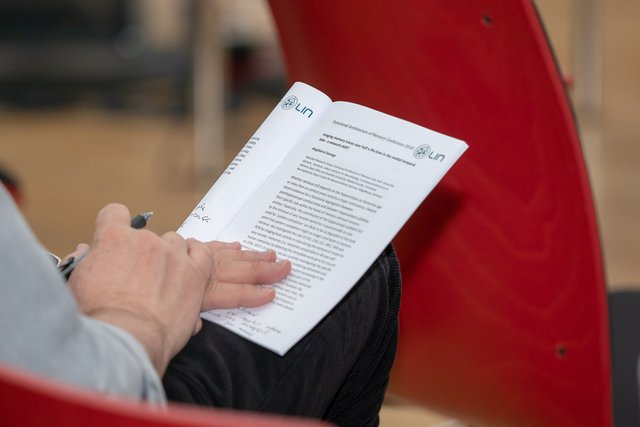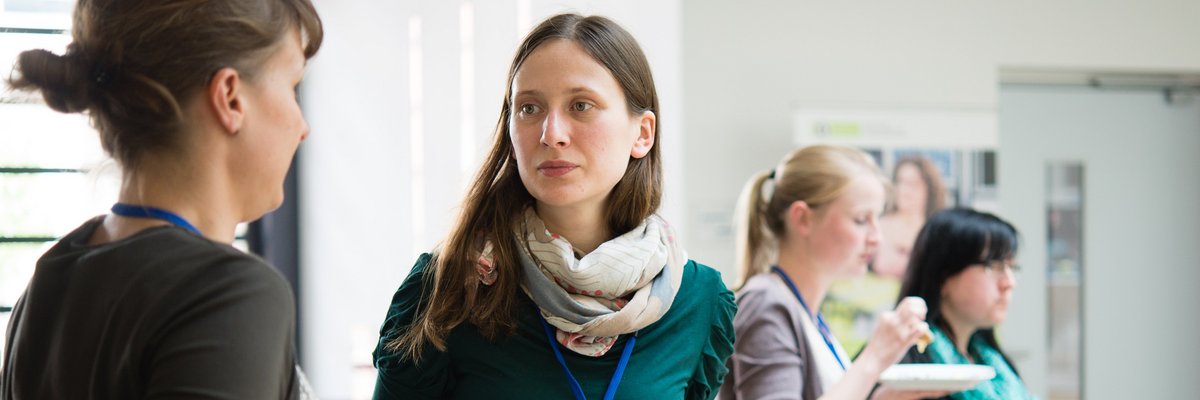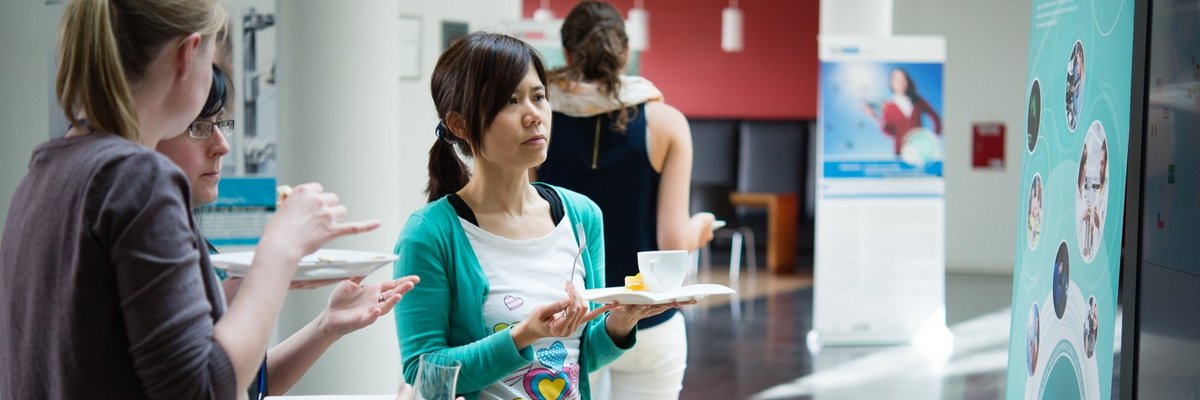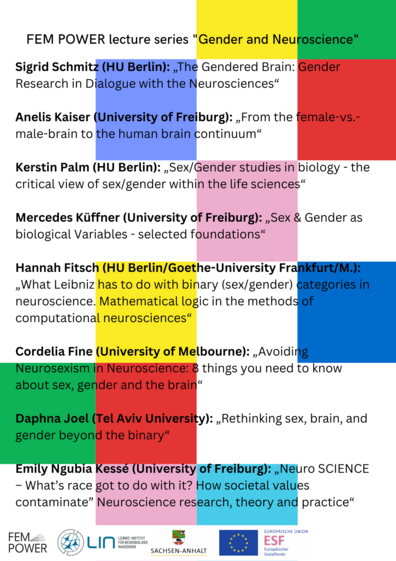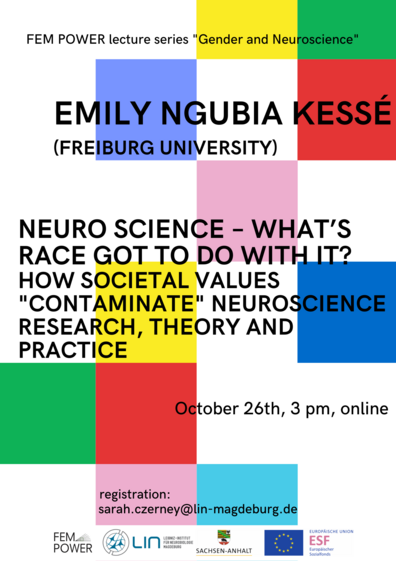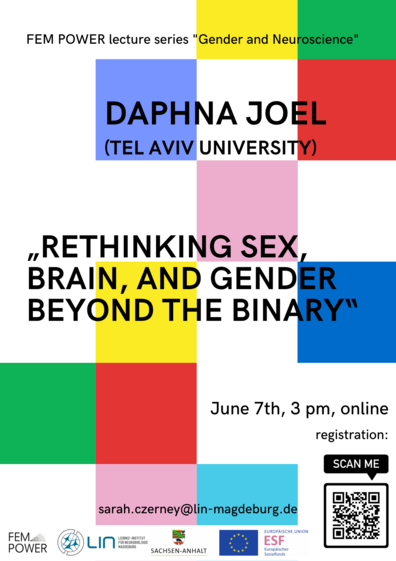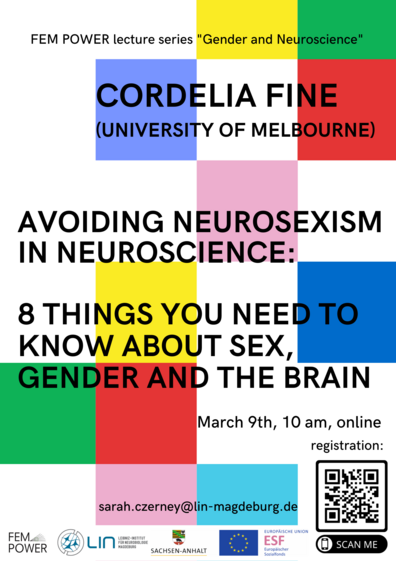Equal Opportunities
The Leibniz Institute for Neurobiology (LIN) is firmly committed to its responsibility to actively promote equality and equal opportunities. We regard this concern not only as a duty, but also as a cross-sectional and management task that is crucial to competing for the best minds in research, science and management at national and international level.
LIN is actively committed to creating framework conditions and developing measures aimed at eliminating gender-specific inequalities and other forms of discrimination based on factors such as origin, age or disability. We also strive to create a working environment characterized by mutual respect, tolerance, fairness and recognition of diversity in the workplace. We work continuously to create an atmosphere in which all employees feel valued and can develop their full potential.
A further aim of gender equality work is to enable the compatibility of professional and private life. This is achieved in particular through flexible working hours and locations as well as targeted programs to promote the careers of women on their way to management positions, be it through individual mentoring programs, training offers for personal and professional development, coaching or networking events. The implementation of these measures is the responsibility of both managers and employees.
- Equal Opportunities Officers at LIN
Equal Opportunities Officers at LIN
The Equal Opportunities Officers advise and support LIN employees on issues and problems in the following areas, among others:
- Reconciling work and family life (e.g. childcare, caring for relatives, pensions)
- Individual questions and problems regarding equal opportunities in training, studies, qualification phase and professional activity
- Conflicts and bullying
- Sexual harassment, disadvantage and discrimination under the General Equal Treatment Act
- Gender equality plan
Gender equality plan
LIN has developed a comprehensive equality concept that ensures that every individual has equal opportunities and rights regardless of gender, age, origin, sexual orientation, religion or other characteristics. Our equality plan is a key tool that enables gender-equitable HR planning. We are actively committed to the career advancement of women in management positions. Our strategy is based on the fields of action recommended by the European Commission:
- Work-life balance and organizational structure,
- Gender balance in leadership and decision making,
- Gender balance in recruitment and career development,
- Integration of the gender dimension in research and teaching content
- Measures against gender-based violence
By regularly reviewing and updating our equality plan, we ensure that we always meet the latest requirements and developments in relation to equality.
- Confirmation of compliance with the requirements for a Gender Equality Plan for participation in Horizon Europe | Download
- General framework
General framework
Our equality work is based on the following standards, agreements and legal framework conditions:
- Research-oriented gender equality standards of the German Research Foundation | Download
- Leibniz Gender Equality Standards | Download
- Guidelines on equal opportunities in the Leibniz Association
- Implementation Agreement to the GWK Agreement on Gender Equality (AV-Glei of October 27, 2008, amended by resolution of the GWK on April 22, 2016 | Download
- Article 3 para. 3 of the Basic Law | LINK
- Act on Equal Opportunities for Women and Men in the Federal Administration and in Federal Companies and Courts (Federal Equal Opportunities Act of 24.04.2015, BGleiG) | LINK
- General Equal Treatment Act (AGG), enacted on 14.08.2006 | LINK
- Women's Promotion Act of the State of Saxony-Anhalt (FrFG) in the version dated 27.05.1997 | LINK
Contact
Maren Bartsch
Equal Opportunities Officer
Tel.: +49 391 626392431
E-Mail: Maren.Bartsch(at)LIN-magdeburg.de
Dr. Hanna Zwaka
Deputy Equal Opportunities Officer
Tel.: +49 391 6263 93441
E-Mail: hanna.zwaka(at)LIN-magdeburg.de
Protection against discrimination, harassment, sexual harassment and bullying in the workplace
- Prevention
Prevention
- Training for employees and managers on the General Equal Treatment Act (AGG)
- Information events on the AGG Information campaign “So Nichtt!” Against sexual harassment in the workplace
- Participation in the FEM POWER project
- Service agreement on protection against discrimination, harassment, sexual harassment and bullying in the workplace
- Contact in case of discrimination
Contact in case of discrimination
At the LIN there are both advisors who are responsible for low-threshold discussions and the AGG complaints office. This is where you can turn if you want to file a complaint.
All counseling persons are trained in dealing with persons affected by discrimination, (sexual) harassment, bullying and (sexualized) violence. The advice is absolutely confidential and protects the anonymity of those affected.
You can find all contact points and the exact procedure here on the intranet.
- AGG complaints office
AGG complaints office
According to the General Equal Treatment Act (AGG), the employer has the duty to protect his employees from disadvantage and discrimination. At the AGG Complaints Office, employees can obtain advice on their rights and options for action and file complaints against discrimination.
Contact person:
Dr. Sarah Czerney
+49-391-6263-92121
sarah.czerney(at)lin-magdeburg.de - External advisory services
External advisory services
Magdeburg:
- Wildwasser e.V.: society against sexualized violence https://www.wildwasser-magdeburg.de/
- Entknoten: advice office in cases of everyday racism and discrimination https://www.alltagsrassismus-entknoten.de/
- Antidiskriminierungsstelle Sachsen-Anhalt http://www.antidiskriminierungsstelle-sachsen-anhalt.de/
- AGG Netzwerkstelle https://www.netzwerkstelle-agg.de/index.php/netzwerkstelle-agg
- LSVD Sachsen-Anhalt: personal or telephone advice for people who are lesbian, gay, bisexual, trans * or inter *
https://lsvd-lsa.de/support/ - Mobile Opferberatung: supports people affected by right-wing, racist, anti-romaist, lgbtiq * hostile, social Darwinist and anti-Semitic violence https://www.mobile-opferberatung.de/
in the region:
- Trans-Inter-Aktiv in Mitteldeutschland e.V.: support and advice for trans, inter and non-binary people http://www.trans-inter-aktiv.org/
in Germany:
- help phone violence against women: 24/7, telefone or online support in 17 languages https://www.hilfetelefon.de/
- Antidiskriminierungsstelle des Bundes: support and advice in several languages https://www.antidiskriminierungsstelle.de/DE/startseite/startseite-node.html
FEMPower@LIN
To promote equal opportunities, we are participating in the project FEM POWER from 2018 to 2023. FEM POWER is an EU-funded programme to promote and establish equal opportunities between women and men in science and research.
Main areas of work in the FEM Power project:
- Individual career planning and development
- Promotion of equality
- Work-life balance
- Gender research and neuroscience
FEM POWER project offers
- For female scientists
For female scientists
- FEM Café: Networking and exchange among female scientists at LIN
- Workshops on career-relevant topics and skills, e.g. career development, time management or rhetoric
- Regular workshops and coaching sessions on "Female Leadership"
- Career talks with successful female scientists
- Impulse lectures and roundtable discussions at the annual Career Day
- creation of an alumnae network
- Individual advice and referral to further offers (e.g. Leibniz Mentoring, MeCoSa, Cometin)
- For executives
For executives
- Regular workshops on „Excellence through gender-sensitive leadership“
- Regular training on the General Equal Treatment Act (Allgemeines Gleichbehandlungsgesetz AGG) with the AGG Network Office Saxony-Anhalt
- Exchange and consultation on topics such as gender bias, gender-appropriate personnel recruitment, active recruitment, anti-discrimination
- For all LIN members
For all LIN members
- Equal Opportunities Commission: In order to make equal opportunities at LIN as effective and sustainable as possible, we established an Equal Opportunities Commission. Representatives of all employee groups work together to develop an equal opportunity plan, exchange ideas on equal opportunity issues, and continue their education.
- Handout on gender-sensitive language
- Prevention of and dealing with discrimination, (sexual) harassment and bullying at the workplace (in cooperation with the AGG network office Saxony-Anhalt)
- Advice on questions of equal opportunities and equality in science and research
- Advice and complaints office in cases of discrimination, harassment, sexual harassment and bullying in the workplace (AGG complaints office)
- Regular newsletter on opportunity (in)equality in science and society
- Past events
Past events
21.02.2019 Career Talk „Herausforderungen und Möglichkeiten für Nachwuchswissenschaftlerinnen in Medizin und Naturwissenschaften“ mit Prof. Jessica Bertrand:
In informellem Rahmen erzählen erfolgreiche Wissenschaftlerinnen von ihrem Werdegang, geben Tipps und beantworten Fragen der Nachwuchswissenschaftlerinnen.
20.06.2019 Roundtable „Scientific Career and Child(ren)“ auf dem Career Day
Scientific career and parenting still seem to be quite incompatible. Many young scientists, especially women (but also more and more men), are wondering if they can pursue a career and start a family at the same time. In this informal discussion, scientists who are also parents talk about their experiences: How do they experience the balancing act between career and family life? How do they organize their careers and their everyday life? What challenges do they see? And what advices would they give to young scientists?
16.01.2020 Workshop Career Development mit Annette Hoeschen
16.01.2020 AGG-Schulung für Beratungspersonen mit Sandra Dänekas (AGG-Netzwerkstelle)
02.03.2020 „Symposium for Novel frontiers in molecular and systems neuroscience“
04.05.2020 Workshop Career Development für Multiplikator*innen (PhD und PostDoc) mit der Graduate Academy der OvGU
23.10.2020 Sigrid Schmitz: „The Gendered Brain: Gender Research in Dialogue with the Neurosciences“ - Vorlesungsreihe „Gender and Neuroscience“
28.10.2020 Workshop „Gleichstellungspläne als Mittel der Qualitätssicherung“ mit Genderkompetenzzentrum Sachsen
23.11.2020 AGG-Schulung für Führungskräfte mit Sandra Dänekas (AGG-Netzwerkstelle)
02./03.12.2020 Workshop und Coaching „Female Leadership“ mit Deborah Ruggieri:
The workshop will focus on development of personal potentials as well as on empowerment of junior scientists. Based on a look at gender and stereotype, socially imprinted patterns of female behaviour will be looked at, and the implications at the workplace environment will be discussed. Conflict management, handling of male dominance and the development of your personal leadership style (and how it differs) will be further topics.
26.01.2021 2.Sitzung Gleichstellungskommission zu gender bias
03.03.2021 „From the female-vs.-male-brain to the human brain continuum“ - Vorlesungsreihe „Gender and Neuroscience“ mit Anelis Kaiser
The topic of sex/gender crosses the research field of neuroscience on different levels. But for some time now, studies have maily focused on examinations of sex/gender difference, i.e., research that reveals differences between women´s and men´s brains. Recently, however, the sex/gender variable has been started to be explored in terms of a human brain continuum. This talk will highlight this progression.
08.04.2021 Career Talk mit Anne Albrecht
In informellem Rahmen erzählen erfolgreiche Wissenschaftlerinnen von ihrem Werdegang, geben Tipps und beantworten Fragen der Nachwuchswissenschaftlerinnen.
28.04.2021 3. Sitzung Gleichstellungskommission
11./ 12.05.2021 Workshop und Coaching "Female Leadership" für Nachwuchswissenschaftlerinnen mit Deborah Ruggieri:
Knowledge about power or status games could lead to a broader view and bigger toolset of communication/negotiation skills as a leader. The participants will get support to recognise the specific patterns of communication and status behaviour in organisations and to develop tools to handle them.
21.05.2021 Führungskräfteschulung „Excellence through gender-sensitive leadership“ mit Dr. Sabine Blackmore:
Die Anforderungen an Führungskräften im Wissenschaftssystem haben sich in den letzten 20 Jahren massiv verändert. Waren einst die Forschungsleistung und Reputation zentrale Qualifikationen einer Führungskraft in der Wissenschaft, sind heute Kernkompetenzen wie Personalmanagement und -entwicklung sowie Konfliktmanagement unabdingbar. Aber auch Gender- und Diversitätssensibilität gehört zur modernen Führung in Forschungseinrichtungen, um den Ansprüchen an Führung und „Exzellenz in allen Bereichen“ begegnen zu können. Diese Schulung setzt genau an diesem Punkt an und eröffnet in 4 Veranstaltungen ein Themenrepertoire der gender- und diversitätssensiblen Führung.
03.06.2021 FEM Café mit career talk: Dr. Sanja Bauer Mikulovic
09.06.2021 Impulsvortrag und Roundtable auf dem Career Day mit Prof. Dr. Kathrin Pittius
"It’s a matter of self-management – or not? Science and parenthood in the context of New Work"
17.06.2021 Prof. Dr. Kerstin Palm: „Sex/Gender studies in biology - the critical view of sex/gender within the life sciences“
Vorlesungsreihe "Gender and Neuroscience":
Gender studies is primarily characterized by a plethora of studies in the humanities and social sciences on Gender relations. Less well known is the critical sex/gender research within biology that has been taking place since the 1970s, which has been researching the biological foundations of sex/gender, sexuality and sex/gender difference. The lecture presents this biological research on gender with examples and explains the theoretical self-understanding of this research.
23.06.2021 Virtual film screening "Picture a Scientist" & Online panel discussion " How male is science?"
When you picture a scientist – what do you see?A man in a white coat, wearing large protective goggles, looking through a microscope or swirling a test tube - for many, this is probably still one of the first images that comes to mind when they hear the word ”scientist”. The documentary PICTURE A SCIENTIST gets to the bottom of the question as to why science in our minds is still a field dominated by men. Biologist Nancy Hopkins, chemist Raychelle Burks, and geologist Jane Willenbring take viewers on a journey through their own experiences in the sciences, ranging from brutal harassment to years of subtle slights. Along the way, from cramped laboratories to spectacular field stations, we encounter scientific luminaries - including social scientists, neuroscientists, and psychologists - who provide new perspectives on how to make science itself more diverse, equitable, and open to all. The screening will be followed by the panel discussion „How male is science?“. Together with scientists from Magdeburg, amongst others the rector of the Hochschule Magdeburg-Stendal, Prof. Dr. Anne Lequy, we want to discuss how male science really still is and what we all can do to change it. Everybody is welcome to join and exchange ideas with us! Bericht zur Veranstaltung hier.
18.08.2021 FEM Café "Book Club: The Gendered Brain by Gina Rippon"
23.09.2021: FEM Café "How to get funding for your research" mit Dr. Christina Spilker
29.09.2021 Mercedes Küffner „Sex & Gender as biological variables (SABV) - selected foundations“
Vorlesungsreihe „Gender and Neuroscience“:
Does the historic sex bias in neuroscience and biomedical research still exist? How can we integrate Sex and Gender to improve Human Health? The sexually dimorphic brain, similar to most sex differences, does not fall into a hard binary readout—but rather is on a continuum or spectrum with each cell and each brain region comprised of varying degrees of ‘male' and ‘female' (Hines, 2005; Joel and McCarthy, 2016). Sex and gender are therefore important variables to consider when designing studies and assessing results within biomedical research. Let’s have a look on how some publications and research policys in the US, Canada and Europe have shaped a new way of thinking and what efforts already have been made by Funding Organizations, Peer-reviewed journals and Universities to advance consistent sex and gender analysis within the research community. Moving away from a strict binary view of how sex/gender is manifested in the brain will be illustrated by selected publications and future challenges on how to establish SABV. By raising awareness from the biological perspective we may contribute to building a society where individuals identifying themselves in between the labels of male and female and feel included rather than discriminated.
20.10.2021 FEM Café Career Talk mit Career Talk: Dr. Nicole Angenstein
17.11.2021 Führungskräfteschulung „Excellence through gender-sensitive leadership“ mit Dr. Sabine Blackmore
Die Anforderungen an Führungskräften im Wissenschaftssystem haben sich in den letzten 20 Jahren massiv verändert. Waren einst die Forschungsleistung und Reputation zentrale Qualifikationen einer Führungskraft in der Wissenschaft, sind heute Kernkompetenzen wie Personalmanagement und -entwicklung sowie Konfliktmanagement unabdingbar. Aber auch Gender- und Diversitätssensibilität gehört zur modernen Führung in Forschungseinrichtungen, um den Ansprüchen an Führung und „Exzellenz in allen Bereichen“ begegnen zu können. Diese Schulung setzt genau an diesem Punkt an und eröffnet in 4 Veranstaltungen ein Themenrepertoire der gender- und diversitätssensiblen Führung.
29./30.11.2021 Individuelles Karrierecoaching für Nachwuchswissenschaftlerinnen des LIN mit Deborah Ruggieri
01.12.2021 Dr. Hannah Fitsch: „What Leibniz has to do with binary (sex/gender) categories in neuroscience. Mathematical logic in the methods of computational neurosciences“ (14:00, online), Vorlesungsreihe "Gender and Neuroscience":
There has been a desire to formalize the complex structure of the brain and its neuronal processes for some centuries. This talk traces the history of the new approaches by using the concept of the mathematization of perception to show how methods and models from computer science and mathematics have found their way into brain research.
02.12.2021 FEM Café "Goodbye 2021 - Hello 2022"
09.12.2021 5. Sitzung Gleichstellungskommission: Workshop „Unbewusste Denkmuster und Stereotype in Organisationen erkennen“ für die Gleichstellungskommission und AGG-Berater*innen des LIN mit Ken Kupzok (Vierfältig)
Unser Unterbewusstsein steckt Menschen in Schubladen: Diese sind notwendig, um die immense Komplexität unserer Umwelt zu vereinfachen. Diese Denkmuster führen z.B: dazu, dass wir Menschen, die uns ähneln, sympathisch finden. Gleichzeitig ist uns Ungewohntes erst einmal suspekt. Diese Verzerrungseffekte passieren ganz automatisch und unbewusst: wir nehmen mentale Abkürzungen, in dem wir fehlende Information über andere automatisch ergänzen. Das reduziert Vielfalt in Organisationen, denn es beeinflusst wer eingestellt wird, Förderung erhält oder den nächsten Karriereschritt macht. Der Impuls- und Austauschworkshop zielt mit einer Mischung aus Information, Erleben & Diskussion darauf ab, kognitive Funktionsweisen zu verdeutlichen, das Bewusstsein für Vielfalt zu schärfen und Rahmenbedingungen für die eigene Praxis zu entwickeln. Denn es braucht strukturelle Unterstützung, sonst denkt unser Gehirn alleine.
13.01.2022 Workshop: "Developing and maintaining resilience in challenging times" für Doktorand*innen mit Angela Daalmann
During challenging times, there is a quality that is more in demand than ever: resilience, i.e. maintaining or quickly restoring mental health during and after adversity. Some also refer to it as our mental immune system. The good news is that resilience is not innate but can be learned. Resilient people manage to master great demands and complex situations with inner serenity, sovereignty and strength. In this workshop you will receive impulses on how to regain strength even during difficult times, focus your energy on the positive and take care of your own stabilization. You will develop action steps in order to live your life with confidence and self-efficacy.
- 26.01.2022 FEM Café mit career talk für Wissenschaftlerinnen des LIN
Das FEM Café ist ein Ort, an dem sich Wissenschaftlerinnen des LIN in informellem Rahmen und vertrauter Runde austauschen, gegenseitig unterstützen und netzwerken können. In regelmäßigen Abständen sprechen etablierte Wissenschaftlerinnen in career talks ehrlich über ihren beruflichen Werdegang, über Erfolge, Herausforderungen, aber auch über das Scheitern, sie geben Tipps und beantworten Fragen. Dieses Mal wird Dr. Liudmila Sosulina von ihrem Werdegang berichten. Bitte schreiben Sie an Sarah Czerney, wenn Sie teilnehmen möchten.
- 17.02.2022 FEM Café mit career talk: Wissenschaftskommunikation mit Dr. Esther Kühn
24.02.2022 Workshop „Umgang mit Widerständen gegen Veränderungen in Organisationen“ für Gleichstellungsakteur*innen
Trotz aller Beteiligungen, Vorabsprachen und Planungen kommt es in der Implementierung von Maßnahmen im Bereich Chancengleichheit und Diversität immer wieder zu Ablehnung oder Abwehrhaltungen gegenüber den Initiator*innen, der Arbeitsweise oder dem Thema. Im Workshop werden Modelle zur Gestaltung von Veränderungsprozessen vorgestellt, die eigene Praxis an Beispielen analysiert und aufbauend darauf Handlungsoptionen entwickelt. Der Workshop richtet sich an die Gleichstellungsbeauftragten, die AGG-Berater*innen und alle, die Interesse am Thema haben. Wenn Sie teilnehmen möchten, schreiben Sie bitte eine Email an Sarah Czerney.9.03.2022 Prof. Dr. Cordelia Fine (University of Melbourne): „Avoiding Neurosexism in Neuroscience: 8 things you need to know about sex, gender and the brain“ (Vorlesungsreihe "Gender and Neuroscience")
Biological explanations of differences in behaviour between women and men or girls and boys are to be found everywhere: from scientific articles, to bestselling self-help books, diversity and inclusion workshops, and Hollywood movies. However, researching, understanding, and interpreting male/female differences in brain and behaviour is surprisingly complicated, and particularly so when humans are involved. To help everyone parse the next biological explanation of female/male differences in behaviour that appears in the academic literature or popular media, this talk will review eight things everyone should know, look out for, and ask: from the nitty-gritty of whether there even is a difference, to the grand sweep of evolutionary explanations. (This talk is based on work co-authored with Gina Rippon and Daphna Joel.)
- 24.03.2022 FEM Café career talk für Wissenschaftlerinnen des LIN: mit Dr. Janelle Pakan, Group Leader "Neural Circuits & Network Dynamics" at CBBS
Das FEM Café ist ein Ort, an dem sich Wissenschaftlerinnen des LIN in informellem Rahmen und vertrauter Runde austauschen, gegenseitig unterstützen und netzwerken können. In regelmäßigen Abständen sprechen etablierte Wissenschaftlerinnen in career talks ehrlich über ihren beruflichen Werdegang, über Erfolge, Herausforderungen, aber auch über das Scheitern, sie geben Tipps und beantworten Fragen.
30./31.03.2022 Workshop und Coaching „Female Leadership“ für Wissenschaftlerinnen des LIN mit Deborah Ruggieri:
Kenntnisse über Macht- oder Statusspiele könnten für Führungskräfte zu einer breiteren Sichtweise und einem größeren Instrumentarium an Kommunikations- und Verhandlungsfähigkeiten führen. Die Teilnehmenden werden dabei unterstützt, die spezifischen Muster des Kommunikations- und Statusverhaltens in Organisationen zu erkennen und Werkzeuge zu entwickeln, um damit umzugehen.
28.04.2022 FEM Café career talk from science to science management für Wissenschaftlerinnen des LIN mit Dr. Christina Spilker
10.05.2022 Führungskräfteschulung "Excellence through gender sensitive leadership" mit Sabine Blackmore
Die Anforderungen an Führungskräften im Wissenschaftssystem haben sich in den letzten 20 Jahren massiv verändert. Waren einst die Forschungsleistung und Reputation zentrale Qualifikationen einer Führungskraft in der Wissenschaft, sind heute Kernkompetenzen wie Personalmanagement und - entwicklung sowie Konfliktmanagement unabdingbar. Aber auch Gender- und Diversitätssensibilität gehört zur modernen Führung in Forschungseinrichtungen, um den Ansprüchen an Führung und Exzellenz in allen Bereichen begegnen zu können. Die Workshopreihe setzt genau an diesem Punkt an und eröffnet in 4 Veranstaltungen ein Themenrepertoire der gender- und diversitätssensiblen Führung.
07.06.2022 „Rethinking sex, brain, and gender beyond the binary“ mit Dr. Daphna Joel (Tel Aviv University), im Rahmen der Vorlesungsreihe „Gender and Neuroscience“
Are the brains of women and men the same or different? Or maybe it’s the wrong question? Sex-related variables affect brain structure and function and there are group-level differences between women and men in specific measures of brain and behavior. These are often taken as supporting the existence of ‘male’ and ‘female’ brains. Studies in rats reveal, however, that sex effects on the brain may be different under different conditions – an observation that led me to formulate the ‘mosaic’ hypothesis – the claim that sex differences in the brain do not add-up consistently in individuals; rather, most brains comprise of both features that are more common in females and features that are more common in males. I will describe the development of the binary conceptualization of the relations between sex and the brain in response to the challenge posed by the mosaic hypothesis and its supporting evidence, and present the results of our recent studies, in which we applied machine learning algorithms to better understand the relations between sex and the brain beyond the binary.
08.06.2022 FEM Café mit career talk: "How to start you own business as a freelancer" mit Dr. Juliane Handschuh
04.10.2022 FEM Café mit career talk: "I want it all! How female scientists can balance career and family plans" mit Dr. Carina Giesen
17./18.10.2022 Einzelcoachings für Nachwuchwissenschaftlerinnen mit Deborah Ruggieri
26.10.2022 „Neuro SCIENCE – What’s race got to do with it? How societal values contaminate Neuroscience research, theory and practice" mit Dr. Emily Ngubia Kessé (University of Freiburg), im Rahmen der Vorlesungsreihe „Gender and Neuroscience“
Neuroscience theory, research and practice (like any other natural science) is essentially tangled up in social power structures and discourses that it has -for as long as its existence- been unaware of, or unwilling to acknowledge. Where does this “contamination” take place, and is inevitable? How can it be operationalized to productively to enrich the way in which neuroscience research is conducted, the way the brain is theorized and in fact even the paradigms and methods used in collecting and analyzing the data? In this talk I would like us to think about the necessity of implementing the concept of intersectionality (that is, how we can take social values into consideration) and weave them into neuroscience research and theorizing.
16./17.11.2022 Landesweiter Tag der Genderforschung Sachsen-Anhalt
24.11.2022 FEM Café mit Career Talk mit Dr. Barbara Schweitzer von der Deutschen Forschungsgesellschaft (DFG)
29.11.2022 Führungskräfteschulung "Excellence through gender-sensitive leaderhip" mit Dr. Sabine Blackmore
16.12.2022 FEM Cafémit Career Talk mit Dr. Carina Fürst (Boston Consulting)
01.02.2023, FEM Café: Miniworkshop "Bye Bye 2022 - Hello 2023! Retrospective, learnings, goals"
Project leaders FEM Power at LIN (2018 - 2023)
Thekla Thiel
Adminstrative Director (- 12/2023)
Dr. Christina Spilker
EU & Research Manager
Tel.: +49-391-6263-92081
E-Mail: christina.spilker(at)lin-magdeburg.de

